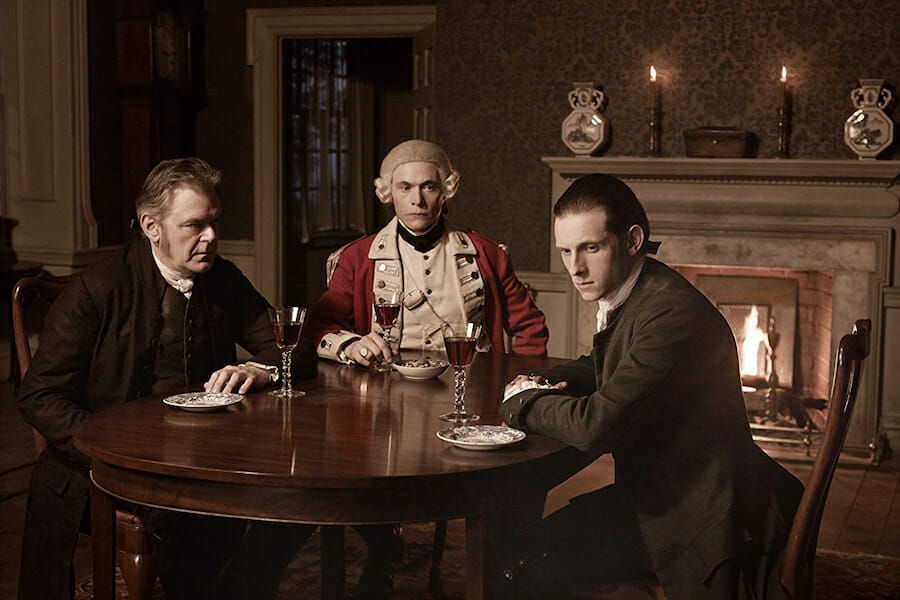
The Tenure of TV’s New Golden Age
The bulk of the hit TV programs that characterized a new Golden Age have now either ended or are in their final season. Consider The Wire, Deadwood, Treme, The Sopranos, Breaking Bad, and Mad Men. What fresh sagas will replace these? Two new shows, one a horse-and-buggy historical drama and one a high-tech contemporary comedy, have begun strong. They address the work of information storage and manipulation in wildly different ways. Turn speaks with a British accent; Silicon Valley speaks geek.
AMC’s Turn, a drama about a Long Island spy ring working for the rebels in the American Revolutionary War, has entered some rich thematic territory. Turn’s prevailing theme is trust—between wartime allies, friends, and family. Abe Woodhull, a cabbage farmer from small-town New York, finds himself drawn into the patriot intelligence operation. His father Richard, a devout Loyalist and a judge, knows nothing of his son’s espionage and still finds reason to question his sympathies.
In the fourth and most recent episode, this father-son conflict begins to assume compelling shades of gray. Richard allows himself to doubt his cause when the redcoat officer stationed in his town insists on lifting headstones from the town cemetery to shield a battery.
These acts of egregious imposition, Abe explains to his father, are the basis of the colonies’ rebellion. Richard’s sharpness toward Abe, we discover, may also be due to residual grief over the loss of his first son Thomas.
Richard’s trepidations are well-told by actor Kevin R. McNally, who is perhaps best known as the aye-and-argh pirate Gibbs from the Pirates of the Caribbean. His speech to the townspeople about sacrifice is proof of his wide range beyond pirate pictures. The father-son verbal tussles over gravestones are a convincing microcosm of the greater issues at stake in the Revolutionary War.
Also complicating the morality of the show is Continental Dragoon Ben Tallmadge’s questioning of the means of the patriot cause. His qualms arise from a confrontation with a superior over the humane treatment of traitors in their midst. And he frets about his falsification of a spy report destined for George Washington.
Perhaps the most iconic image from the series yet is the long wooden table used for laying out the intelligence reports for Washington’s attention. The camera pans over scroll after scroll of hand-written information. Some documents may be pure lies, some may be illegible, while others may be trumped up in the hopes of gaining Washington’s preferment. At least one document, we know, tells of a deadly detachment of Hessians marching toward Trenton. In an elemental way, this scene reminds us of the time and talent necessary for successful intelligence analysis in Washington’s age and ours.
HBO’s Silicon Valley is the theater of the absurd compared to Turn’s high drama.
Developed by Mike Judge, the director and writer of Office Space, Silicon Valley revolves around a gang of software programmers in the Valley, living and working under the roof of app inventor and part-time stoner Erlich, played by the affable T.J. Miller. Erlich once sold his app Aviato for a million dollars and he still toddles around in the company car. He offers his programmers lodging, cabinets full of Ramen, and plenty of second-hand marijuana smoke, in return for a 10 percent stake in any new company formed in the incubator.
When shy, awkward Richard discovers a brilliant algorithm for lossless data compression, he quits his job at software giant Hooli and sells a stake in his algorithm-based business to kooky tech mastermind Peter Gregory in return for hundreds of thousands in seed money. Richard invites Erlich to join him on the board of directors for his new outfit, Pied Piper, but only after a kerfuffle with his housemate about the name of the company.
In a hilarious scene, Erlich hits the road for the Sonoran desert to meditate on a replacement name for Pied Piper. He is armed with a bag full of hallucinogenic mushrooms. Stuck in traffic, Erlich settles for a gas station men’s room as a meditation venue, where he tries to find a company name that combines the technological with the world-saving ethos that suffuses Silicon Valley. He likes the idea of “Technolojesus,” but gets caught up in his meditation refrain: “Making the world a better place. Making the world a better place.”
Silicon Valley is, in this world, high on corporate mantras and low on common sense. Demographically, its worker bees are overwhelmingly white males in their twenties. Though one of the corporate titans of the region, Hooli, prides itself on 21st century tactics like “bike meetings” on cycles built for six, its CEO has a raider mentality that would make Gordon Gekko proud. Having failed to buy Pied Piper from Richard, Hooli uses a sample of his signature algorithm to engineer an inferior version of it with a new name—“Nucleus.”
Both Turn and Silicon Valley feature young protagonists conflicted between grand ideals and practical necessities. Abe has his father, his wife, and his friends to answer to. Richard has his programmer family and his growing self-respect.
Let’s hope these young shows continue to shine despite the brilliant afterglow of Breaking Bad.

